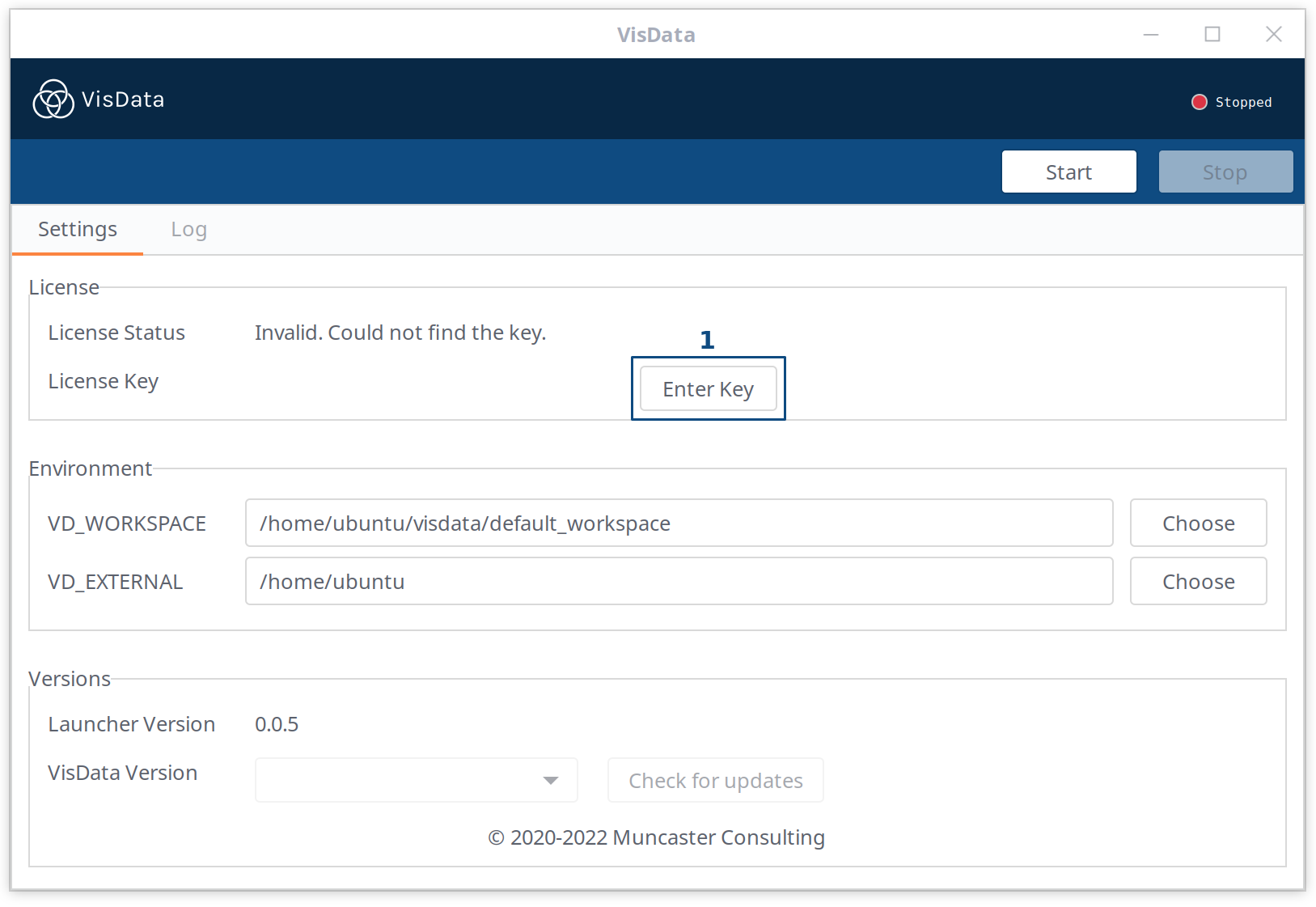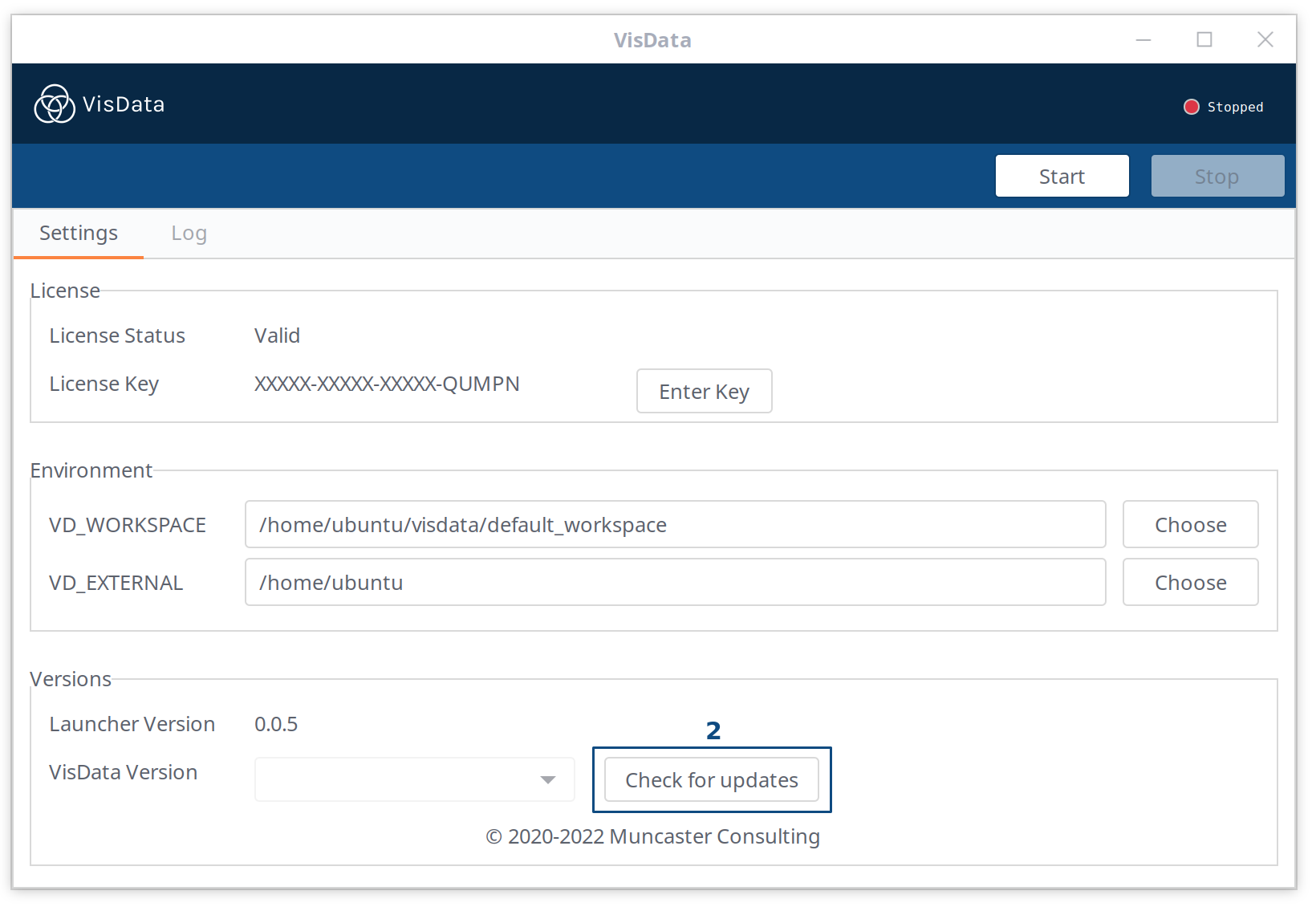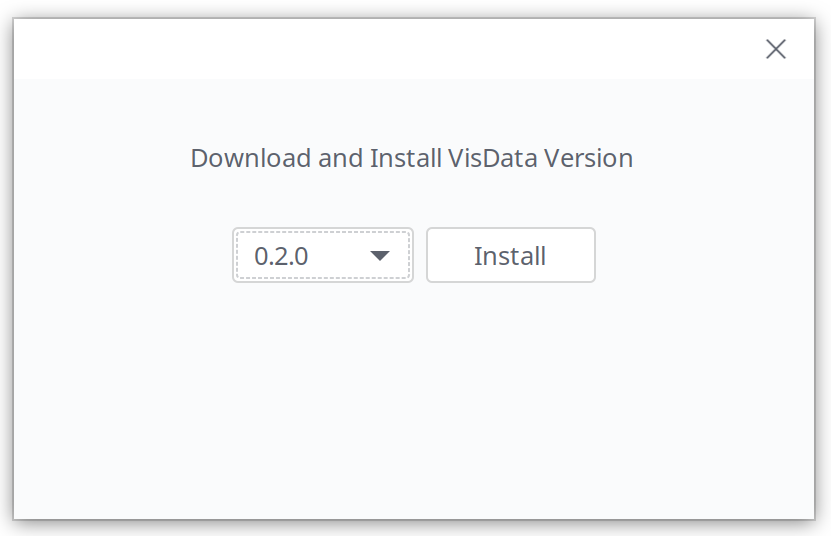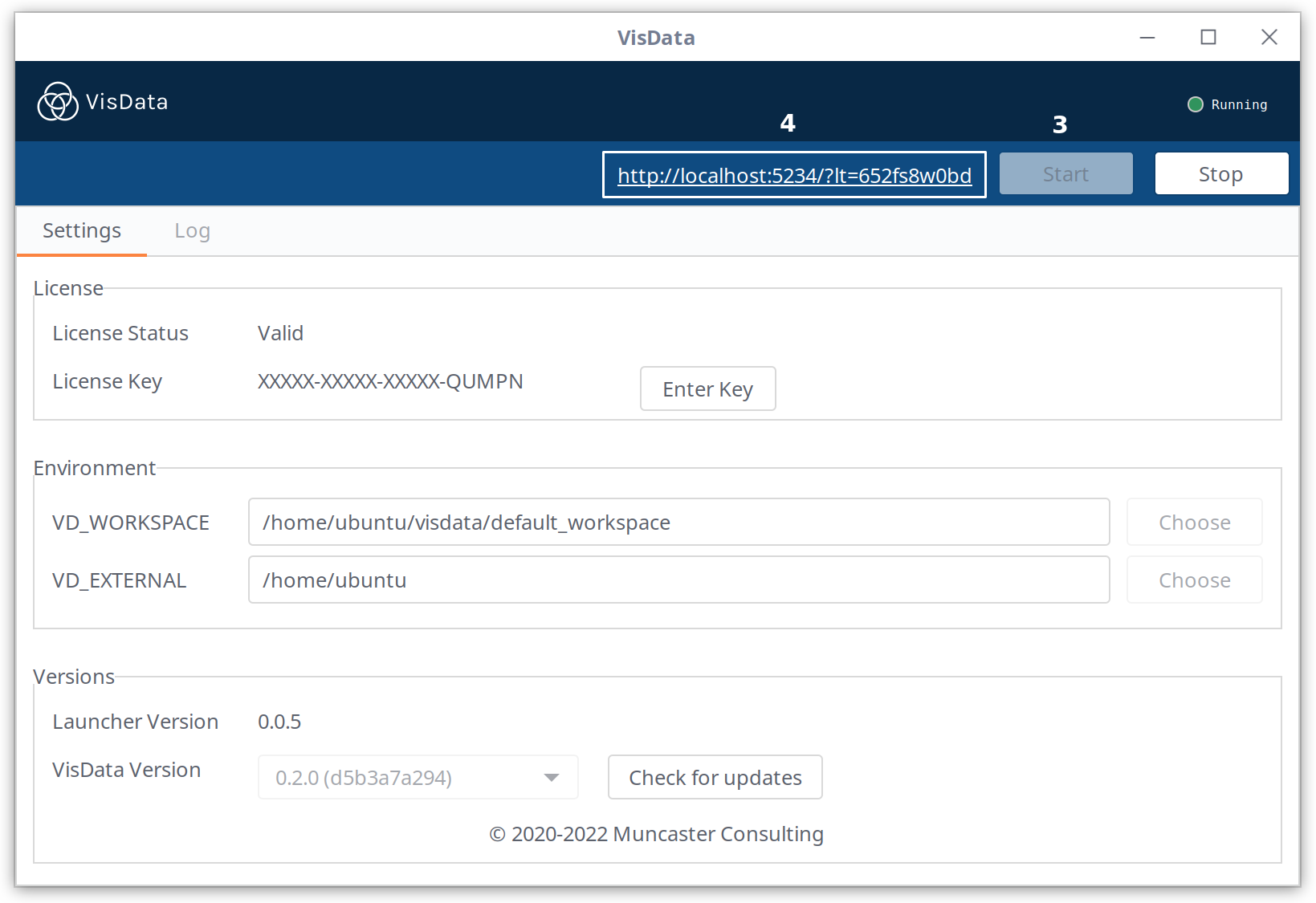Install on Linux
VisData™ runs as a web application within Docker. This offers a wide range of system compatibility as well as fast, incremental updates. A native launcher application, VisData Launcher, is used to manage app updates, workspaces, and licenses. The launcher needs to be installed as the first step.
- Requirements
Docker 19.03.6+
64-bit x86 processor (Intel and AMD)
At least 4GB of memory
2.5 GB of disk space for minimal install
Chrome/Chromium web browser recommend for best experience
Note
VisData™ Beta is officially supported on Linux and Windows (WSL). For Windows see Install on Windows.
Dependencies
Ubuntu 18.04+ is required to run VisData. To install Docker, curl, and Chromium (Chrome-based web browser) run the following:
sudo apt update && sudo apt install docker.io curl chromium-browser
By default Docker is configured to communicate only with the root user
and to allow your user to run Docker containers add yourself to the docker group.
sudo groupadd docker
sudo usermod -aG docker $USER
# Rebooting is highly recommended to ensure group access is applied everywhere
# Alternatively run the following to apply the new group in the current terminal session
newgrp docker
To verify that your user is part of the docker group run the following:
id | grep docker
gid=136(docker) groups=136(docker), ..
Latest Docker Version
Note
Alternatively to get the most up-to-date version of Docker feel free to follow the official Docker installation guide for Ubuntu. This is not required, but some users may want to be on the latest Docker build.
Other Linux Distros
For other distributions you can follow the official Docker installation guides:
For Chromium installation on other Linux distros please use the following link from Snapcraft. Alternatively download Google Chrome for Linux.
Graphical Installation
Install the VisData Launcher
curl -s https://visdata.io/beta/get-visdata.sh | bash
# Run the launcher from the terminal (or find it in the launcher menu as "VisData")
visdata
After starting the VisData Launcher you will need to enter a license key (1).

Once the license key has been verified press “Check for updates” (2) which will allow you to download the latest app.

Select the latest version (newest versions are shown at the top) and press install. This will download and install a VisData image.

After downloading a VisData image press “Start” (3). After a moment a login link with appear (4). Press it to open VisData in the browser.

After successful installation proceed to the Quick Start Guide
Headless Install
curl -s https://visdata.io/beta/get-visdata.sh | bash
~/.local/bin/ allowing the user to open the VisData Launcher from anywhere.visdata -v
VisData Launcher v0.0.9
usage: visdata_launcher [-h] [-v] [--no_auth] [--debug]
[--headless [{enter_license,install,start,list,help}]]
[--version VERSION]
Enter product license key
visdata --headless enter_license
VisData Launcher v0.0.9
Current VisData license key:
Please enter your license key:
xxxx-xxxx-xxxx-xxxx
Successfully updated license key...
Download the latest version of the app
visdata --headless install
VisData Launcher v0.0.9
Installing the latest available version of VisData with the tag: "0.2.5"
-------------------------------------------------
Usage Hints
-------------------------------------------------
To list all available versions run the following:
./visdata_launcher --headless list
To install a specific version run
./visdata_launcher --headless install --version 0.2.5
..
Downloading...
Extracting
Pull complete
Finished downloading new image
Configure workspace
vim ~/.visdata/config/visdata.config
"workspaces": [
{
"name": "default",
"workspace": "/home/username/visdata/default_workspace",
"external_data": "/mnt/external_disk"
}
]
Launch the app
visdata --headless start
Troubleshooting
Docker Permissions Error
Symptom
A Docker permissions error can manifest itself as the following error message.

In addition, you may see the following when running the VisData Launcher from the command line you may see the following error
ERROR: Docker initialization failed...
Error while fetching server API version: ('Connection aborted.', PermissionError(13, 'Permission denied'))
You may also see the following when running Docker commands directly
docker: Got permission denied while trying to connect to the Docker daemon socket at unix:///var/run/docker.sock
Solution
Add your current user to the docker group and then it is recommended to reboot your machine.
The following shows an alternative way apply group changes without rebooting, but it will only apply to the current terminal session.
Run the following commands:
# Add a docker group
sudo groupadd docker
# Add docker group to user
sudo usermod -aG docker $USER
# Apply new group changes in the current terminal
newgrp docker
Now check your Docker installation by running this simple test. You should be able to be run the command without root privileges.
docker run -it hello-world
Unable to find image 'hello-world:latest' locally
latest: Pulling from library/hello-world
2db29710123e: Pull complete
Digest: sha256:97a379f4f88575512824f3b352bc03cd75e239179eea0fecc38e597b2209f49a
Status: Downloaded newer image for hello-world:latest
Hello from Docker!
This message shows that your installation appears to be working correctly.
To generate this message, Docker took the following steps:
1. The Docker client contacted the Docker daemon.
2. The Docker daemon pulled the "hello-world" image from the Docker Hub.
(amd64)
3. The Docker daemon created a new container from that image which runs the
executable that produces the output you are currently reading.
4. The Docker daemon streamed that output to the Docker client, which sent it
to your terminal.
Missing GLIBC
Symptom
[2711] Error loading Python lib '/home/ubuntu/.visdata/bin/visdata_launcher/libpython3.6m.so.1.0':
dlopen: /lib/x86_64-linux-gnu/libc.so.6: version `GLIBC_2.25' not found
(required by /home/ubuntu/.visdata/bin/visdata_launcher/libpython3.6m.so.1.0)
Solution
VisData requires a modern Linux distribution such as Ubuntu 18.04 or Ubuntu 20.04.
Ubuntu 16.04 LTS has reached end-of-life, so for security and stability it is no longer supported.
Launcher Unexpectedly Crashes
Symptom
VisData Launcher unexpectedly crashes while using the app.
Solution
The VisData Launcher requires a connection to the internet and the Docker engine must be running, so first please make sure those requirements are satisfied.
Run docker info to get additional Docker details
docker info
Client:
Debug Mode: false
Server:
Containers: 5
Running: 0
Paused: 0
Stopped: 5
Images: 171
Server Version: 19.03.6
Storage Driver: overlay2
Backing Filesystem: extfs
Supports d_type: true
Native Overlay Diff: true
Logging Driver: json-file
Cgroup Driver: cgroupfs
...
You can try running the launcher directly by executing:
bash ~/.visdata/bin/visdata
# Or alternatively run the binary directly
~/.visdata/bin/visdata_launcher/visdata_launcher
This may expose errors that are not shown in the user interface. If these steps do not lead to a simple solution please reach out to VisData support for additional help.
VisData Does Not Launch When I Press “Start”
Symptom
When pressing start from the launcher nothing happens.
Solution
Please view the log tab in the launcher as this may expose common problems. If this step does not lead to a simple solution please reach out to VisData support for additional help.
Slow Start-Up Time with Non-functional Search
Symptom
The app starts up, but only after a long wait time, but does not function properly with the following errors in the log tab (or alternately printed in headless mode in Docker logs):
Starting Docker Container
Running as user ID: 1000046
[0.001s][warning][os,container] Duplicate cpuset controllers detected. Picking /sys/fs/cgroup/cpuset, skipping /usr/src/app/vd_external/sys/fs/cgroup/cpuset.
[0.002s][warning][os,container] Duplicate cpuset controllers detected. Picking /sys/fs/cgroup/cpuset, skipping /usr/src/app/vd_external/var/lib/docker/overlay2/03d4aff14d45dd7ccee180425a7a8740bf0b925e90d2a6d915b32cc342fad81b/merged/sys/fs/cgroup/cpuset.
[0.001s][warning][os,container] Duplicate cpuset controllers detected. Picking /sys/fs/cgroup/cpuset, skipping /usr/src/app/vd_external/sys/fs/cgroup/cpuset.
[0.002s][warning][os,container] Duplicate cpuset controllers detected. Picking /sys/fs/cgroup/cpuset, skipping /usr/src/app/vd_external/var/lib/docker/overlay2/03d4aff14d45dd7ccee180425a7a8740bf0b925e90d2a6d915b32cc342fad81b/merged/sys/fs/cgroup/cpuset.
[0.001s][warning][os,container] Duplicate cpuset controllers detected. Picking /sys/fs/cgroup/cpuset, skipping /usr/src/app/vd_external/sys/fs/cgroup/cpuset.
[0.002s][warning][os,container] Duplicate cpuset controllers detected. Picking /sys/fs/cgroup/cpuset, skipping /usr/src/app/vd_external/var/lib/docker/overlay2/03d4aff14d45dd7ccee180425a7a8740bf0b925e90d2a6d915b32cc342fad81b/merged/sys/fs/cgroup/cpuset.
[0.001s][warning][os,container] Duplicate cpuset controllers detected. Picking /sys/fs/cgroup/cpuset, skipping /usr/src/app/vd_external/sys/fs/cgroup/cpuset.
[0.002s][warning][os,container] Duplicate cpuset controllers detected. Picking /sys/fs/cgroup/cpuset, skipping /usr/src/app/vd_external/var/lib/docker/overlay2/03d4aff14d45dd7ccee180425a7a8740bf0b925e90d2a6d915b32cc342fad81b/merged/sys/fs/cgroup/cpuset.
Error: Could not find or load main class [0.001s][warning][os,container]
Caused by: java.lang.ClassNotFoundException: [0/001s][warning][os,container]
Solution
This is a result of setting the External Data path to the system root: /. Set your External Data path to a more specific path that does not encompass the /sys directory.
When the /sys directory is mounted multiple times Elasticsearch refuses to work properly.
Miscellaneous
Removing old VisData images
You can remove old VisData Docker images with the following (this will not delete any of your workspace data):
# First list all available images
docker images
REPOSITORY TAG IMAGE ID CREATED SIZE
781755162954.dkr.ecr.us-west-1.amazonaws.com/visdata 0.1.2 3d215b1968be 12 days ago 2.28GB
781755162954.dkr.ecr.us-west-1.amazonaws.com/visdata 0.0.7 dd485bbbaf33 3 months ago 2.93GB <- Old version
...
# Delete an old image by image id
docker rmi dd485bbbaf33